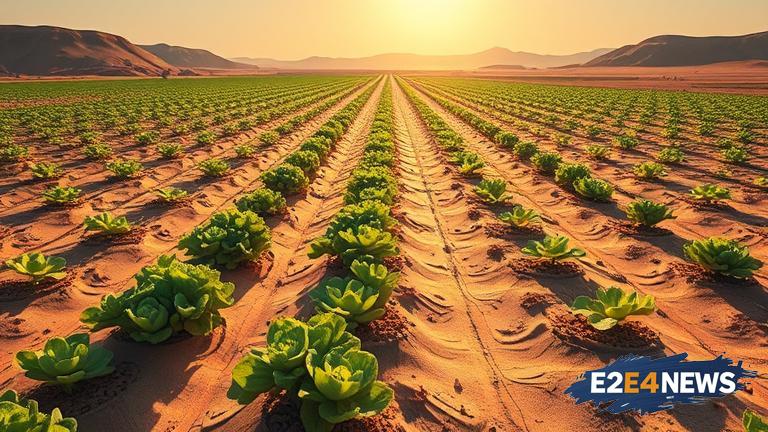Israel has long been a pioneer in agricultural innovation, and its latest endeavors in desert farming are no exception. The country’s agricultural sector has been working tirelessly to develop and implement new techniques to increase crop yields and promote sustainable agriculture in the desert regions. One of the primary methods being used is precision agriculture, which involves the use of advanced technology such as drones, satellites, and sensors to monitor and control crop growth. This approach allows farmers to optimize water and fertilizer usage, reducing waste and minimizing the environmental impact of farming. Additionally, Israeli farmers are utilizing advanced irrigation systems, such as drip irrigation, to conserve water and reduce evaporation. These innovative methods have already shown significant results, with some farms reporting increases in crop yields of up to 30%. The Israeli government has also launched initiatives to support desert farming, including the establishment of a new agricultural research center in the Negev desert. The center will focus on developing new technologies and techniques for desert farming, as well as providing training and support for farmers. Furthermore, the government has implemented policies to encourage the development of desert agriculture, such as providing subsidies for farmers who adopt sustainable practices. The use of renewable energy sources, such as solar and wind power, is also being promoted to reduce the carbon footprint of farming. Israeli farmers are also experimenting with new crops, such as dates and jojoba, which are well-suited to the desert climate. The introduction of these new crops is not only providing a new source of income for farmers but also helping to promote biodiversity in the region. Moreover, the development of desert farming is also creating new job opportunities in rural areas, helping to reduce unemployment and promote economic growth. The success of Israel’s desert farming initiatives has also attracted international attention, with many countries seeking to learn from its experiences. In fact, Israel has already signed agreements with several countries to share its expertise and technology in desert farming. The country’s innovative approach to agriculture has also led to the development of new industries, such as agricultural technology and biotechnology. These industries are not only providing new opportunities for entrepreneurs and startups but also helping to drive economic growth and innovation. Overall, Israel’s desert farming initiatives are a testament to the country’s commitment to innovation and sustainability. By adopting cutting-edge technologies and techniques, Israeli farmers are not only increasing crop yields but also promoting environmental sustainability and economic growth. As the global demand for food continues to rise, Israel’s innovative approach to desert farming is likely to play an increasingly important role in ensuring food security and promoting sustainable agriculture. The country’s expertise in this area is also likely to have a significant impact on the development of agriculture in other countries, particularly in regions with similar desert climates. In conclusion, Israel’s desert farming initiatives are a shining example of the country’s innovative spirit and its commitment to promoting sustainable agriculture and economic growth.




